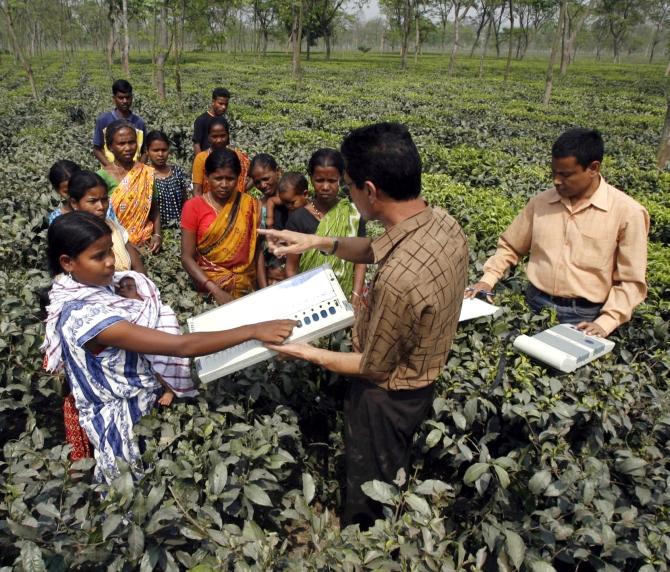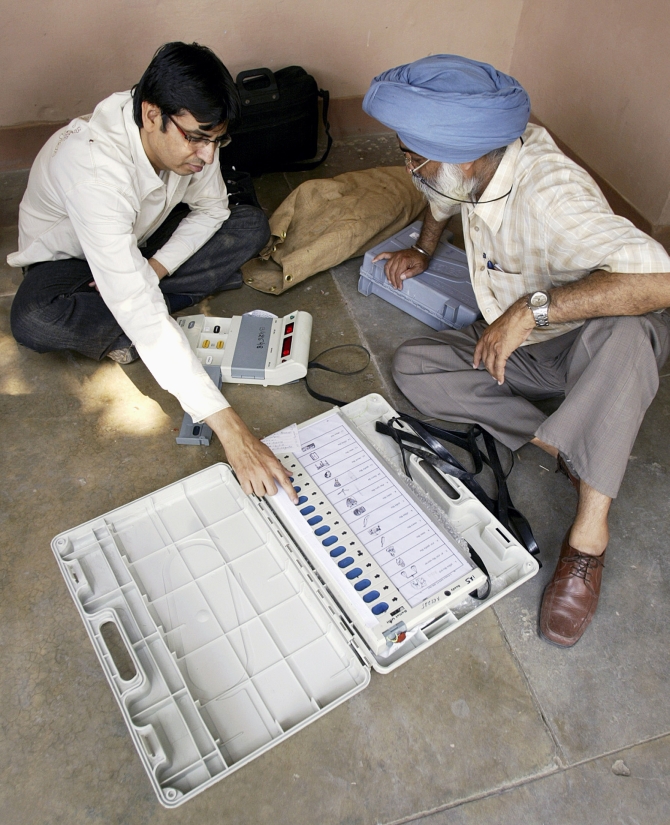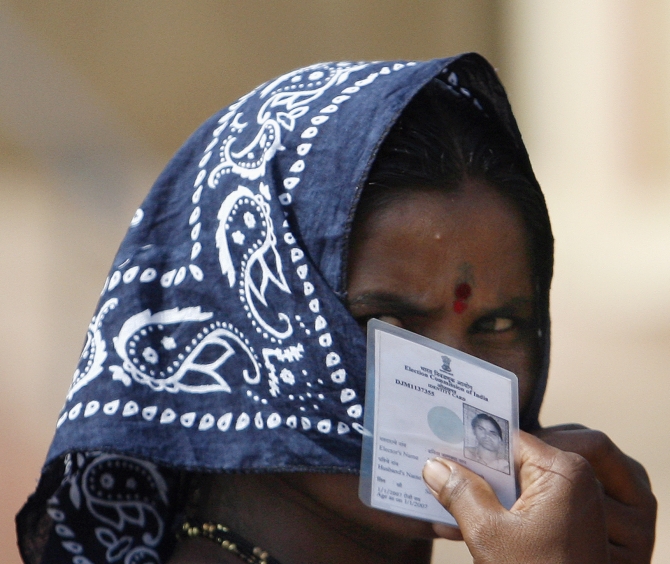
Polling in the upcoming Lok Sabha elections is likely to commence in the second week of April and may be spread over seven phases, the longest so far, highly placed sources said on Sunday.
The probable dates for the commencement of polling are between April 7 and 10, the sources in the Election Commission told PTI while emphasising that the poll schedule was still being "fine tuned".
As of now, the plan is to have voting, involving over 81 crore voters, in seven phases but efforts are on to reduce that to six phases. The 2009 polls were held in five phases from April 16 to May 13.
The much-expected announcement of the schedule is expected in the middle of this week. The Model Code of Conduct for governments and political parties will come into force from the date of announcement.
However, the Election Commission has ruled out advancing the schedule or compressing it to avoid the summer heat, a demand put forward at the all-party meeting convened by the commission last month.
The term of the current Lok Sabha expires on June 1 and the new House has to be constituted by May 31.
Along with the Lok Sabha polls, Andhra Pradesh, including the regions comprising the newly-carved out Telangana, Odisha and Sikkim will go to polls to elect new assemblies.
Highly placed sources in the EC said finishing touches were being given to the schedule. Consultations with the Union home ministry, state governments, para-military forces and the chief electoral officers of states have already been completed.
…

There was speculation that the announcement may be slightly delayed for the Centre to promulgate some of the ordinances it plans to bring out against corruption and on some other issues but there is no confirmation of it.
If a six or a seven-phased schedule is finalised, it would be the first time the country would witness elections over such a long period.
The sources said that the attempt is to "maximise" use of forces and the polling days. In the first phase, polling is expected to be held in some of the Naxal-hit states and in some northeast states.
For the first time in parliamentary polls, a system of paper trail for electronic voting will be introduced in some constituencies on a trial basis.
There have been demands that a paper trail should be in place so that a foolproof record is created and controversies avoided in case of a dispute or an election petition filed in courts.
In a bid to create a level-playing field, the Model Code of Conduct bars governments in the Centre and in the states from making any kind of announcements regarding new schemes or promises so as to lure voters.
The EC has also issued guidelines to political parties asking them to explain the rationale of financing the promises they make in their election manifestos. The guidelines that followed Supreme Court directions in this regard have now been made part of the Model Code.
…

An estimated 81.4 crore voters will be eligible to vote in the coming elections after 9.71 new voters have been added to the rolls since the last elections.
From the coming elections, candidates in a parliamentary constituency in bigger states can spend up to Rs 70 lakh on their campaign, up from Rs 40 lakh in 2011. In the 2009 elections it was Rs 25 lakh.
Another first in the Lok Sabha elections will be the introduction of "None of the Above" option in voting, which was put in vogue in the assembly elections a few months ago.
The electoral rolls are ready after being updated with January one this year as the cut-off date.
A total of 1.1 crore poll personnel, half of them being security forces will be deployed for the smooth conduct of polls and to ensure that they are free and fair. Poll officials said the database of the civilian staff to be deployed for conducting polls has been prepared and at least 5.5 million civilian staff would be deployed.
The list of central government employees to be deployed for poll duty as micro observers in sensitive polling stations has also been prepared. (
About 8 lakh polling stations have been set up across the country keeping in view the convenience of both the voters and the poll staff.
…

Preparations have been made for deployment of around 12 lakh electronic voting machines with the addition of another 2.5 lakh new EVMs which it had ordered with various public-sector companies.
During the 2009 polls, there were 714 million voters against 671 million voters in 2004 Lok Sabha polls. The EC favours a multi-phased election for a country of India's size and electorate because it is better that there is "complete satisfaction" of voters. Otherwise, it can lead to "discontentment" in case of any shortcomings, they said.
Some states will be accorded special treatment due to their being affected by extremism.
The EC sources said the commission has not conducted any election in a single go in one phase after 1971 as the size of the electorate in the world's largest democracy has grown considerably over the years.
The officials also said that the entire poll process takes around three months time. But there is a limit of six weeks time from the announcement of the schedule to the first date of poll in view of the Supreme Court direction that the Model Code of Conduct inhibiting government decisions cannot be an unduly long period.
They said the poll panel has to give around two weeks' time for government formation before the term of the Lok Sabha or a state assembly expires. In the states of Andhra Pradesh, Odisha and Sikkim, which will have assembly polls along with the Lok Sabha polls, the EC will place two EVMs alongside for voters to vote in both the elections.
Andhra Pradesh has 42 Lok Sabha constituencies and a 294-member Assembly. Out of this, 25 Lok Sabha constituencies and 175 assembly constituencies will remain with the residuary state of Andhra Pradesh, while Telangana will have 17 Lok Sabha seats and 117 Assembly seats.
Odisha will also elect its 147-member assembly while Sikkim has a 32-member state assembly.
The terms of the Andhra Pradesh assembly is till June 2, that of Odisha is till June 7, and of Sikkim till May 21.
Click on MORE to see another PHOTO feature...